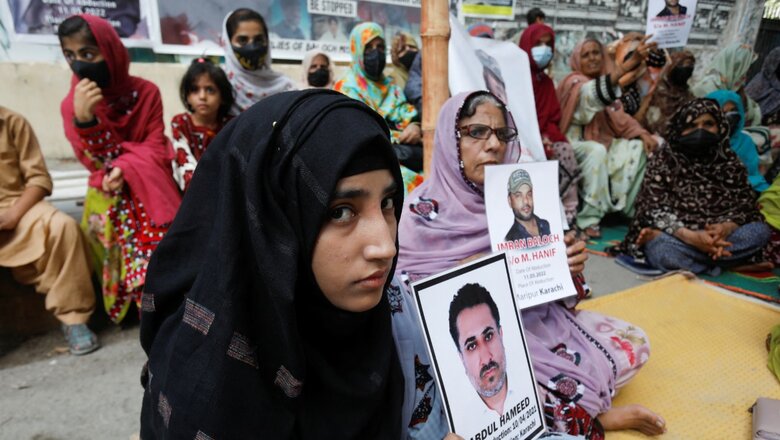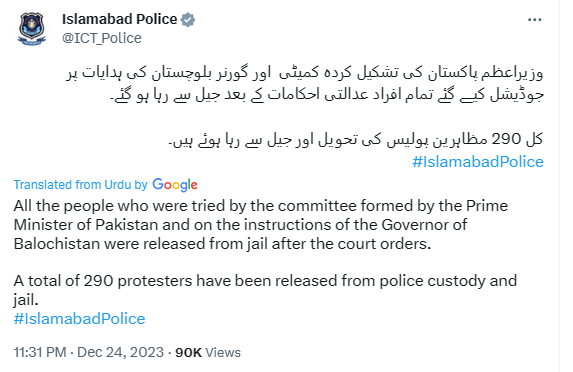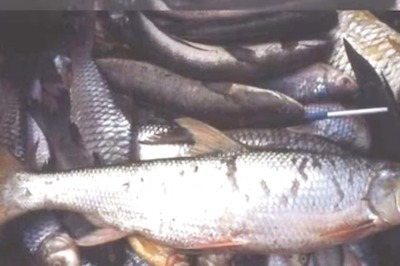
views
A few days after severe criticism from human rights groups, Islamabad police announced on Sunday night the release of nearly 300 Baloch protesters arrested during a demonstration against “enforced disappearances.”
The Baloch long march — which started in Balochistan’s Turbat on December 6 after the “extra-judicial killing” of a Baloch youth by the hands of Pak security agencies — had reached the federal capital on Wednesday.
In response to peaceful protest, Islamabad police used “excessive force” against the Baloch protestors, who reached the capital to stage a protest. The police crackdown drew widespread condemnation from human rights bodies and political parties.

What’s the history of enforced disappearances
Enforced disappearances have long been a stain on the Islamic country’s human rights record. Despite the promises of successive governments to criminalise the practice, there has been slow movement on legislation while people continue to be forcibly disappeared with impunity.
The groups and individuals targeted in enforced disappearances in the country include “people from Sindhi, Baloch, Pashtun ethnicities, the Shia community, political activists, human rights defenders, members and supporters of religious and nationalist groups, suspected members of armed groups, and proscribed religious and political organisations in Pakistan.”
Cases
Last year, enforced disappearances continued throughout the year without any respite, along with the intimidation of families seeking justice. Enforced disappearances continued unabated in Balochistan, targeting young Baloch and Pashtun activists, including those based in other provinces. According to the Commission of Inquiry on Enforced Disappearances, at least 2,210 cases remained unresolved in 2022.
In some cases, rights groups say persons are openly taken into custody by the police or intelligence agencies, and families trying to find out where they are held are denied information by the authorities. “Some victims are eventually released or their whereabouts are disclosed to their families but they continue to be held in arbitrary detention including in internment camps. Those forcibly disappeared are also at risk of torture and death during captivity,” according to Amnesty.
What Rights Groups said
After last week’s arrests, the Human Rights Commission of Pakistan (HRCP) said it was appalled by the state’s response to peaceful protestors, with women, children and the elderly subjected to unwarranted force in the form of water cannons and use of batons. “Numerous women protestors have reportedly been arrested and separated from their male relatives and allies,” the rights group said.
PRESS RELEASEGovernment must hear out Baloch protestors, release women jailed
Islamabad, 21 December 2023. The Human Rights Commission of Pakistan (HRCP) strongly condemns the violent state crackdown on Baloch citizens who have led a long march from Turbat to Islamabad in… pic.twitter.com/unrFwVvtff
— Human Rights Commission of Pakistan (@HRCP87) December 21, 2023
The group said the poor treatment of Baloch citizens exercising their constitutional right to peaceful assembly and freedom of expression is inexcusable. “The state’s widespread use of enforced disappearances and extrajudicial killings also warrants a prompt and transparent investigation as well as a commitment to hold the perpetrators accountable,” HRCP said.
In a statement, Amnesty also expressed deep concerns about the excessive use of force by law enforcement against the Baloch Long March protestors in Islamabad. “Amnesty has reviewed videos showing water cannons, tear gas and batons being used against the protestors. Dozens have been detained and several others injured, including women, minors and elderly persons, violating their rights to liberty, security and protest,” the group said.
Pakistan: @amnesty is deeply concerned by the excessive use of force by law enforcement against the Baloch Long March protestors in Islamabad on 21 December. Amnesty has reviewed videos showing water cannons, tear gas and batons being used against the protestors. Dozens have been…— Amnesty International South Asia, Regional Office (@amnestysasia) December 21, 2023
Time and again, rights groups have called for an impartial investigation into all extrajudicial killings and enforced disappearances, particularly in Balochistan. Moreover, they have asked the government to compensate families of victims of extrajudicial killings and those who forcibly disappeared.




















Comments
0 comment